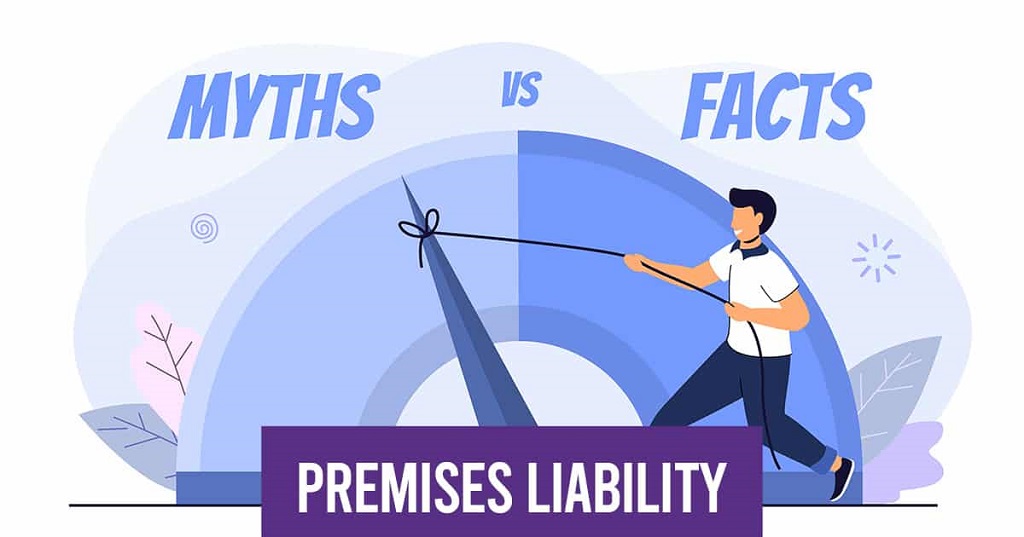Premises liability is one of the most important subsets of personal injury law. For those who’ve been injured on someone else’s poorly-kept property, or for property owners who experience financial damage from a negligent pedestrian, premises liability law can provide a useful lifeline. However, many dangerous and untrue myths surround premise liability law (even in 2023). To help you free yourself of these lies, here is a guide debunking five of the most common myths surrounding premise liability law:
Myth #1: Premise Liability Simply Means “Fall Accident”
Although slip-and-fall accidents, or simply “fall accidents” are incredibly commonplace in premise liability courtrooms, they are only one of many types of premise liability cases that are filed. There are many different kinds of premises liability cases, even though slip and fall cases are among them. Dog bites, pool accidents, snow and ice buildup, elevator and escalator accidents, poor property upkeep, incidents of attractive nuisances, fire, flood, or water leak, poor security, inappropriate stacking or storage that falls on top of someone, and many more are examples of this type of incident. If you or a loved one have been harmed by a negligible property owner, you should contact a Decatur law firm with premises liability experience to get the payout that you deserve.
Myth #2: Only Property Owners Can Use Premise Liability Law
It’s a total myth that only landlords and property owners can file via, and benefit from, premise liability law. Landlords and property owners frequently file lawsuits for premises liability. These people, however, are not the only ones who might be responsible for an accident that occurs on someone else’s property. Every person who oversees or administers a property could be held responsible for accidents that happen there. For instance, even if they do not own the property, a business manager may be liable for a slip and fall caused by an unsecured spill. Similarly to this, anyone whose carelessness leads to a premises liability injury may be held accountable.
Myth #3: Only Physical Injuries Fall Under Premise Liability Law
While physical injuries are the most common injury type for premise liability cases, other injuries and damages can be taken into account as well. The majority of premises liability cases are for monetary damages for actual injury. Due to physical injuries, victims may be entitled to compensation for hospital bills and other medical costs. Yet, many victims also have a right to compensation for non-physical wounds, as well as for losses in terms of both personal and financial resources. Take this case for example a victim may be entitled to compensation for the cost of the necessary psychological care if they experience depression or post-traumatic stress disorder as a result of the accident. Some victims have the option to make claims for the suffering they underwent as a result of the incident.
Myth #4: Property Owners are Immune to Premise Liability Law if They Post Warnings
This is one of the most dangerous myths surrounding premises liability law in 2023. The mere fact that a property owner publishes a written sign or offers any sort of warning does not absolve them of liability. By giving visitors sufficient notice, property owners can reduce their exposure to some extent, but if their notices are insufficient or difficult to see, they could still be held accountable. If a property owner tries to gaslight you on this topic, be sure to contact your premises liability attorney immediately to get things sorted out. Doing so will ensure you do not miss out on an opportunity to receive the compensation you deserve for your suffering. An Illinois-local premises liability lawyer will be especially helpful in this scenario.
Myth #5: Filing a Claim Isn’t Necessary when Dealing with Premise Liability Law
While some people may tell you otherwise, properly filing a premise liability case is key to getting a payout, and holding negligent property owners accountable. Your wounds might be more severe than you believe, and you might need substantial medical attention and rehabilitation, or you might never fully recover from them. For instance, you might think that tripping over a wire you didn’t see at someone’s place of business was your fault, but the business owner is responsible for ensuring the safety of their property, and the accident wouldn’t have occurred if the wire hadn’t been left out. Even though court cases can be difficult and drawn out, making a claim may be in your best interest, and can lead you down a path where you receive enough compensation to feel as though justice has been served in your premise liability case.

